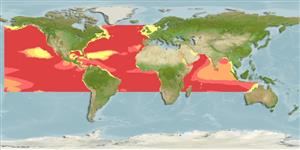Preferred temperature (Ref.
123201): 2.2 - 6.7, mean 3.8 °C (based on 2428 cells).
Phylogenetic diversity index (Ref.
82804): PD
50 = 0.5059 [Uniqueness, from 0.5 = low to 2.0 = high].
Bayesian length-weight: a=0.00102 (0.00046 - 0.00225), b=3.06 (2.88 - 3.24), in cm total length, based on all LWR estimates for this body shape (Ref.
93245).
ระดับชั้นอาหาร (Ref.
69278): 3.7 ±0.58 se; based on food items.
ความสามารถในการกลับคืนสู่ปกติ (Ref.
120179): ต่ำ, เวลาต่ำสุดที่จะทำให้ประชากรเพิ่มขึ้นเป็น 2 เท่าใช้เวลา 4.5 - 14 ปี (Assuming tmax>10).
Fishing Vulnerability (Ref.
59153): Moderate to high vulnerability (51 of 100).
Nutrients (Ref.
124155): Calcium = 11.4 [2.5, 45.7] mg/100g; Iron = 0.307 [0.091, 1.024] mg/100g; Protein = 18.3 [15.8, 20.9] %; Omega3 = 0.209 [0.066, 0.681] g/100g; Selenium = 19.5 [5.4, 84.2] μg/100g; VitaminA = 14.2 [1.6, 116.9] μg/100g; Zinc = 0.374 [0.168, 0.924] mg/100g (wet weight);
